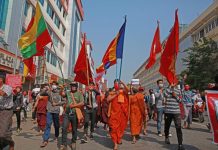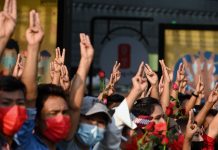
Thailand rolls back its protest ban following the avalanche of tens of thousands of people onto the streets of Bangkok.
The Thai government announced in a statement posted in the official Royal Gazette that it would lift measures that prohibit political gatherings of five or more people and releasing news that could impact security.
The government specifically prohibited: “publication of news, other media, and electronic information that contains messages that could create fear or intentionally distort information, creating misunderstanding that will affect national security or peace and order.”
“The current violent situation that led to the announcement of the severe situation has eased and ended to a situation in which government officials and state agencies can enforce the regular laws,” the statement said.
The protest movement calls for a new constitution, the dissolution of parliament and resignation of Prime Minister Prayut Chan-o-cha, as well as a stoppage in the government’s intimidation of critics.
People's demands
“He’s still seeking to stay in power while ignoring all the people’s demands. The emergency decree shouldn’t have been issued in the first place,” Sirawith “Ja New” Seritiwat, one of the protest leaders, said.
Meanwhile, Patsaravalee “Mind” Tanakitvibulpon was one of the protesters who got arrested during the crackdown. Talking to reporters, Patsaravalee, 25, said that the court found the charges not serious and that she must attend classes and exams. Bail was granted to her without having to submit any guarantees.
Panusaya Sithijirawattanakul, a 21-year-old student, said: “It is now or never. The root cause of political problems stemmed from this institution, we couldn’t just dance around and ignore it anymore more.”
“Otherwise we are going to end up in the same vicious political cycle again. Coups after coups with an endorsement from the King,” Sithijirawattanakul argued.
Protest speech
In August, social media giant Facebook said it was planning legal action in response to the Thai government’s order to block user access to Royalist Marketplace, a group with 1 million members featuring posts about Thailand’s monarchy.
According to Facebook, it was compelled by the Thai government to prevent Thailand users from having access to Royalist Marketplace after it had deemed the content of the group “to be illegal.”
The firm said it was being pressured by the Thai government to restrict some types of political speech in the country, with the government threatening criminal proceedings against its representatives in Thailand.
A spokesperson for the firm issued a statement saying: “Requests like this are severe, contravene international human rights law, and have a chilling effect on people’s ability to express themselves.”
“We work to protect and defend the rights of all internet users and are preparing to legally challenge this request,” the spokesperson added.
Thailand’s Prime Minister defended the government’s decision to ask for the Royalist Marketplace to be blocked and threatening legal action, saying: “There is no such thing as special dictatorial power used in this case. The court’s order has been properly obtained. Thailand has its own laws and everyone has to respect the laws of each country.”






